Dazed and Discoursed
All Episodes
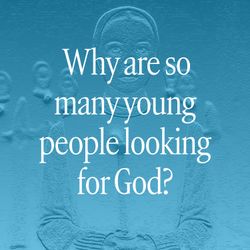
14. Why are so many young people looking for God?
27:48||Season 1, Ep. 14“More and more young people are embarking on spiritual journeys,” writes Susan Akyeampong in her latest article, ‘Why Are So Many Young People Looking for God?’. In 2019, just 22 per cent of 18 to 24-year-olds in the UK said they believed in God. By early 2025, that figure had more than doubled to 45 per cent. New research commissioned by the Bible Society reveals that, since 2018, the number of young men attending church has risen from 4 per cent to 21 per cent, while attendance among young women has grown from 3 per cent to 12 per cent. A similar trend can be seen in the US, where 46 per cent of Gen Z identify as Christian – many of them young boys and men. But what’s behind this religious revival? And why is this surge in faith and churchgoing largely concentrated in conservative Christian spaces?This week on the podcast, Halima Jibril and Elliot Hoste are joined by editorial director Ted Stansfield (our resident Christian) to unpack what’s drawing young adults to faith and spirituality, the reasons behind the striking gender divide and whether online trends like #tradcath and “Catholic chic” are making Christianity more attractive to the chronically online.Related articles: Why Are So Many Young People Looking for God? by Susan AkyeampongTrump and the changing face of America’s young evangelicals by Laura Pitcher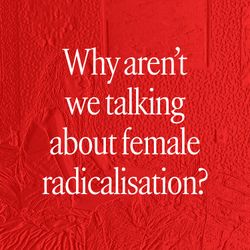
13. Why aren’t we talking about female radicalisation?
27:38||Season 1, Ep. 13Jack Thorne and Stephen Graham’s Adolescence has sparked vital conversations around the radicalisation of young boys and men. However, writer Esme Hood argues that while these discussions are crucial, they often overshadow an equally pressing issue: the radicalisation of young women.From platforms like Tumblr normalising self-harm and eating disorders content, subtly desensitising girls to violence and control to “tradwife” aesthetics that repackages far-right values in aesthetically pleasing, hyper-feminine forms, framing submission and domesticity as aspirational.In this episode, Halima Jibril and Elliot Hoste sit down with Hood to unpack the gendered nuances of radicalisation, question why female susceptibility is so often overlooked and ask how we combat this quiet but profoundly effective form of propaganda online.Related articles: We need to talk about female radicalisation by Esme Hood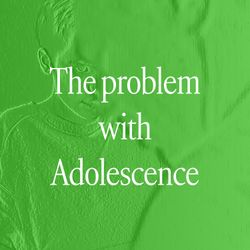
12. The problem with Adolescence
32:46||Season 1, Ep. 12Since its release on Netflix last month, Jack Thorne and Stephen Graham’s Adolescence is all anybody has been talking about. The British crime drama television mini-series centres on a 13-year-old schoolboy named Jamie Miller (Owen Cooper) who is arrested for the murder of a girl in his school. The show has reinvigorated conversations about the manosphere, incels and the rise of misogyny among young boys and men. In this week’s episode, Halima Jibril and Elliot Hoste are joined by our deputy editor, Serena Smith, to discuss the show’s popularity, the Labour government’s new initiative to show Adolescence in schools, the problems with the way we discuss toxic and positive masculinity, and so much more. Related articles: ‘The problem with Adolescence’ by Serena Smith ‘Are young men really doomed?’ by Halima Jibril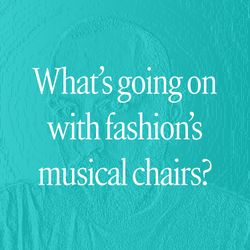
11. What’s going on with fashion’s musical chairs?
36:22||Season 1, Ep. 11Since March 2024, the fashion world has stepped into an alternate timeline. In the last 12 months, we’ve seen a frankly ridiculous number of creative directors change jobs, with announcements happening days and sometimes even hours apart. Right now, the biggest houses in fashion are simultaneously refreshing their top teams – referred to by fans online as a game of “musical chairs.”Whether you love that phrase or not, it’s here to stay, with everyone from Chanel and Gucci to Versace and Loewe catching the bug. While it’s fun to speculate who’s going where (as you’ll find out in this episode), why is this all happening now, and what does it say about how the industry values the creativity of its designers? Behind the constant commentary, there are also teams of very real people dealing with the rumours and subsequent fallout.In this episode, fashion writer Elliot Hoste is joined by editorial director Ted Stansfield and fashion director, editorial & commercial partnerships Emma Davidson to discuss the “unprecedented” reshuffle and its online culture, run through all the rumoured appointments, address the white male elephant in the room, plus make some suggestions for vacant positions at Balenciaga, Fendi, Dior and more.
10. Are we all severed?
33:52||Season 1, Ep. 10Dan Erickson’s critically acclaimed Apple TV+ series Severance has returned for its second season. The show centres on Lumon, a mysterious corporation that has developed a novel medical procedure known as ‘severance’. This process allows employees to split their professional (“innie”) and personal (“outie”) identities via a microchip implanted in their brains. The chip activates when descending to the eerie severed floor, erasing all memories of their outside lives. Conversely, once they leave the office, they have no recollection of what they do from nine to five.Severance is a brilliant and complex exploration of late-stage capitalism, identity, loss, and belonging. While often described as a dystopian sci-fi series, our deputy editor, Serena Smith, argues in her latest essay, “Are we all severed?” that its world is eerily similar to our own. “How many of us contain parts of our identities just to get through the day? How many of us have gone to work while depressed, brokenhearted or grieving? On a macro level: how many of us have gone to work knowing that wars, famines, and genocides are happening? Arguably, under late capitalism – which prioritises work over all else – we’re all kind of severed.”This week on the podcast, Smith joins Halima Jibril to explore how capitalism forces us to split our identities, the consequences of ignoring pain and suffering and why the fragmentation of the self is such a compelling theme in popular culture.This episode contains spoilers for Severance seasons one and two.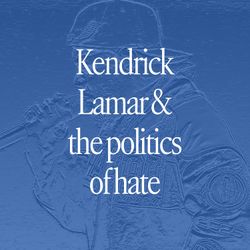
9. Kendrick Lamar and the politics of hate
27:41||Season 1, Ep. 9Since the Super Bowl, Kendrick Lamar has been all we’ve been able to think about. From his effortlessly cool bootcut jeans, his reimagining of Uncle Sam as the incomparable Samuel L. Jackson to the continuous jabs he made at Drake throughout his 13-minute performance – Lamar has been crowned by the public as thee professional hater. He even says it himself on Euphoria, his first full diss track aimed at Drake, calling himself “the biggest hater.” Over the last year, the general public has revelled in Lamar’s pettiness, celebrating his commitment to the art of the grudge. For many, Lamar inspires them to be better haters. But what kinds of hate are most celebrated in our society, and what depictions are condemned? In this episode, host Halima Jibril and Elliot Hoste are joined by music writer Solomon Pace-McCarrick to discuss the Lamar-Drake beef, the kinds of hate that are the most acceptable in society today and how their feud reflects a deeper battle over Black masculinity.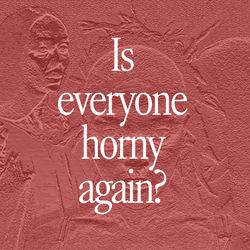
8. Is everyone horny again?
33:43||Season 1, Ep. 8From Halina Reijn’s Babygirl and Robert Eggers’ Nosferatu to FKA twigs’ EUSEXUA and Ethel Cain’s Perverts, sex is back in the mainstream. And it’s not just any kind of sex — as Emma Garland argues in her latest essay, “Everyone is Horny Now”, “there has been a pendulum swing not just towards sex, but towards deviance.”With Nicole Kidman being dog-walked by her twenty-something-year-old male intern, Nosferatu elevating the conflict between repression and liberation to Biblical proportions and FKA twigs referring to the softer edges of her music as “the pussy,” music and media are depicting sex in ways that challenge socially accepted norms.But what makes these depictions so deviant? And eight years on from the height of the #MeToo movement, how has the cultural conversation around sex evolved and what impact has it had on how sex is portrayed?In this episode, hosts Halima Jibril and Elliot Hoste are joined by Garland to unpack the latest and most provocative depictions of sex in popular culture, explore why pleasurable sex is often framed as transgressive, and argue why everyone needs to let go and just be gross.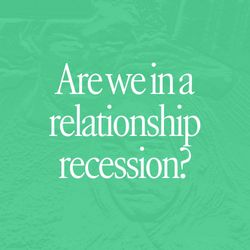
7. Are we in a relationship recession?
31:54||Season 1, Ep. 7Dating is in the pits – everyone says so. In England and Wales, fertility rates are at an all-time low, with the US similarly reaching its lowest rate in 2023. Last week, our deputy editor, Serena Smith, wrote about how “the dating crisis is going global.” From the US to Finland, South Korea, Turkey, Tunisia, and Thailand, birth rates are falling, and it’s likely that part of this decline can be attributed to a corresponding drop in the number of couples. When relationships do form, they’re more fragile than they were in the past – but how did we get here?Has the internet made us more antisocial and more prone to discarding people? Are the apps really ruining dating, or are they a scapegoat for a larger and more deeply entrenched set of problems?In our second episode of the year, hosts Halima Jibril and Elliot Hoste are joined by Smith to explore the ‘relationship recession’, the crisis in heterosexual dating and how conservative modern dating shows have become.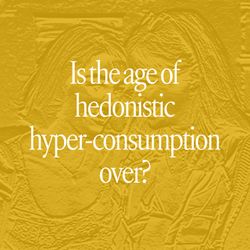
6. Is the age of hedonistic hyper-consumption over?
29:20||Season 1, Ep. 6In July 2024, writer and artist August Lamm shared her prediction for the future on X: “I’m calling it right now: abstention is the next big thing. Sobriety, celibacy, digital minimalism, dumb phones, religion. The age of hedonistic hyper-consumption is over. We’re moving into a new peaceful age marked by moderation and self-discipline. I can’t wait.”Lamm, who has been without an iPhone for two and a half years, wasn’t basing her prediction on trends she’d seen online (she doesn’t have a phone, remember?). Instead, she expressed her desire for a shift in culture, grounded in the belief that we have reached peak hyper-consumption. From Brat being synonymous with hedonistic indulgence, to Stanley cup fads and excessive skincare hauls, to Oxford’s Word of the Year, “brain rot”, a term describing the negative effects of consuming low-quality or trivial online content, 2024 was undeniably a year of excess.As we enter the new year, however, a cultural shift seems to be emerging. People are challenging their consumption habits by participating in low-buy or no-buy years, where they refrain from shopping for an entire year. Others are turning to digital detoxes in an effort to rebuild their attention spans, productivity and overall well-being.In this episode, hosts Halima Jibril and Elliot Hoste are joined by Lamm to unpack our addiction to consumption, our scarcity mentality, and whether we’re simply swinging from one extreme to another – from hedonistic hyper-consumption to complete restriction. Is this the beginning of a world without pleasure, or could moderation finally offer the balance we’ve been craving?Featured articles: No-buy 2025: So you want to try a year without shopping?How to avoid ‘lifestyle creep’You Don't Need a Smartphone: A Practical Guide to Downgrading & Reclaiming Your Life by August Lamm
loading...